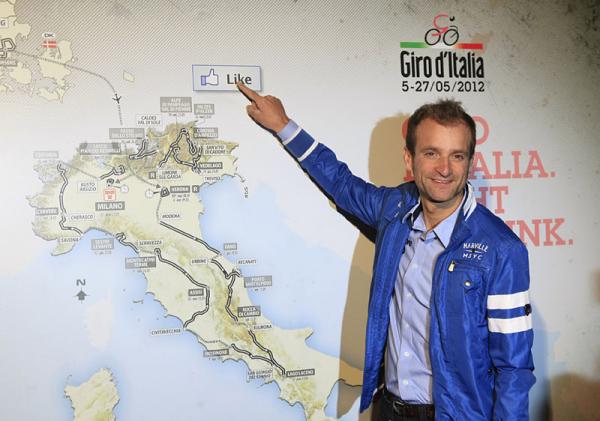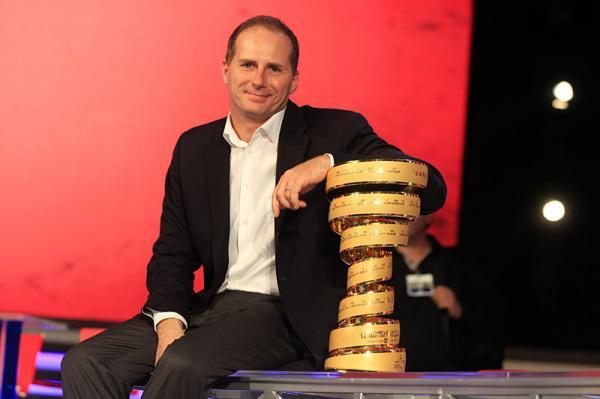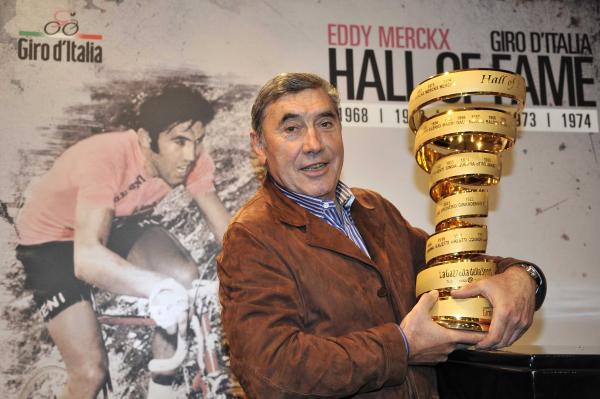Acquarone: "We wants kids to grow up watching the Giro"
RCS chief on Giro's past, present and future, and honouring Weylandt



This article originally appeared in the 2012 Giro d'Italia Official Programme
Following on from Angelo Zomegnan’s resignation last summer, the managing director of RCS Sport, Michele Acquarone, heads up a team charged with reinforcing the Giro d'Italia's claims to the title of the world’s hardest race in its most beautiful place. Acquarone outlined his vision to Daniel Friebe at Giro headquarters in Milan in March.
Michele, you’re career path isn’t a typical one for a man in your position now. If we had your CV here, it would say former deejay, tennis instructor, lifeguard…
I think I’ve always been someone who’s tried to challenge himself. When I was at school and university, I also taught swimming and tennis to earn a bit of cash, or I was a walk-on extra in films. I tried to challenge myself while spending as much time as possible in the fields I was passionate about, in other words sport, showbusiness and tourism. Then, when I finished university, the first real job I had was here in the RCS group, after which there’s been a progression to get to the point where I am now, as the managing director of the RCS sport.
The first job I did here was in the marketing department of the Gazzetta dello Sport. But now I feel like a fairly experienced manager, not just a “marketing man” as some journalists in Italy have pigeonholed me. That was why I felt capable of taking on this role when Angelo Zomegnan left. When Angelo left, we could have nurtured someone from the inside or taken on someone from the outside. To be honest, opinion was split as to what we should do. I was one of those who wanted us to recruit internally, whereas others thought we should bring in a journalist or someone else connected with cycling.
I finally put myself forward because I didn’t want someone from the outside coming in and ruining a team which worked well together, and which in the last three years has been very successful. I was worried about the instability that might cause. Angelo is a guru in cycling – everyone knows him, and the next man in was always going to be in danger of suffering the comparison, especially if it was someone young. I accepted because I have so much faith in this team, the team Angelo created, that I have nothing to worry about. I haven’t felt any pressure or worries and I think I can say today that the transition has been almost seamless.
You alluded to Zomegnan’s standing in the cycling world. Will the Giro not miss him?
Get The Leadout Newsletter
The latest race content, interviews, features, reviews and expert buying guides, direct to your inbox!
We miss Angelo, his charisma, but I don’t think that our product will suffer. Going back to what people say about my marketing background, I also think that’s a good thing: if I had to sum up marketing in one sentence, it’d be about paying the consumer the maximum possible attention. And this is vital even if you’re running a Classic bike race or a Grand Tour which has been going for a hundred years.
It’s really about understanding what the consumer wants and trying to give it to him or her. The more you do that, and the more humble you are and the more you try to understand the consumer, the better the product you’ll have. But that’s also the key: humility. In Italy we have a lot of people who think they know everything and don’t listen to their consumers.
So, will that balance mean less “extreme” courses than we’ve seen over the past few years?
Angelo tried lots of things, did lots of experiments. For example, for the Centenary Giro in 2009, he tried a strange, upside-down Giro with the big mountains at the start. Did it go down well?
Well…
No, it didn’t, really, let’s be honest. Having the mountains at the start didn’t go down well, so the next year he inverted it and put a lot of mountains at the end. It was a very exciting Giro in 2010 – we had the strade bianche in Tuscany, the Aquila stage which should have been quite routine but because of the weather almost decided the Giro, then we had the guys who had lost time there trying to make up lost ground in the mountains in the last week, not forgetting that we also had a great start in Amsterdam and a grand finale in Verona.
There, we said to ourselves that that kind of Giro worked. We said to Angelo, yes, this is the way to go: the hardest race in the most beautiful place, which became our slogan. Then, last year, we climbed Everest; if we’d piled all of the mountains on top of each other we’d have ended up on the moon. It was too extreme, too complicated, and it asked too much of the riders and everyone else, too. The fans were the first to say, “Oh, this is too much”. So even if Angelo had stayed, we’d have designed a Giro like this one in 2012. Because we’ve taken the best of 2010 and tried to eliminate the worst of 2009 and 2011 to design the best possible Giro.
There’s something for the sprinters, some mixed stages, lots of mountain stages and a queen stage which has really been designed for the fans, with the climbs they wanted to see. What more could you want? Both cycling and what people want are constantly evolving. That’s what makes it hard. Last year David Millar said that the queen stage was too long and too hard, that something shorter and more intense would have been better. We’ll see.
Would you agree that some of the excesses of the past few years came about because the race had been betrayed by its riders, or because the stars weren’t Italian, and hence there was a lot of pressure on the course to provide entertainment?
The first thing I’d say is that we don’t have any single rider who can move the masses in Italy at the moment. We have a few good riders – Scarponi, Nibali, Cunego – but we don’t have anyone who, when he goes into a bar, the bar fills up straight away like it would with, say, Boonen in Belgium. The average Italian still hankers after Pantani, and we don’t have anything like him at the moment.
Also, Lance Armstrong dominated world cycling to such an extent for six or seven years that he was the only major international star in the sport. He helped the Tour de France grow even bigger yet never came to the Giro in his peak years. The result was that the Tour kept growing while the Giro stayed where it was. Now we have to make up ground, and we can do it by trying to convince the biggest stars to come to our race, but it’ll still be their decision. Our biggest weapon in that battle for hearts and minds is the audience; the more people are watching, the more stars will want to come.
The second thing we have to hope is that in this big talent pool of 20 and 21-year-olds in Italy, somewhere lurking there’s another Pantani or Armstrong, that guiding star for the masses. But that’s beyond our control, as is the riders’ final decision whether or not to ride the Giro. What we can do, the only thing, is to build up the biggest possible international audience and grow our race so that our team is ready when a huge star comes along and captures the imagination again. We haven’t had that pied piper effect for the last few years, that excitement, and yet the race has grown, so that at least shows we’re moving in the right direction.
We’ve all seen stages in the past to Alpe di Pampeago, over the Mortirolo and the Stelvio, but are there any other days we should set the video for, which could surprise us?
I make no secret of the fact that I’m not the biggest expert on racing, or that I’ve never ridden a bike, so I may not be the best judge. That said, I’m pretty confident that the second weekend will surprise and excite a lot of people. That Friday, that Saturday and that Sunday are all “three star stages” in our race brochure, yet no one has really talked too much about them. But the people who designed the course, who went to see those places, and know those roads, have assured me that they could be three cracking stages.
There are fifty potential winners on those days: sprinters, puncheurs, breakaway specialists, climbers – everyone might have a chance. They’re also stunning places, in the centre and centre-south of Italy. The stage to Lago Laceno will be spectacular. I think the criticism of the course this year from a few people has been a bit gratuitous and didn’t give enough credit to stages like this.
One of the criticisms is that you’ve snubbed the south. It’s not strictly true, is it?
Well, there is a big part at the bottom of the boot that we haven’t covered, I acknowledge that, but who cares; maybe next year we’ll do a lot in the south and another part of the country will get neglected. Italy is long and narrow, and this dictates that there will always be a few regions that don’t get visits, and which have to accept that.
Our problem is a bigger, cultural one – Italy is divided into the north and the south, and if you don’t go to the south much they say, ‘Ah, it’s those idiots from the North who hate the South, again, and want to make it a Giro of northern Italy’. Which of course isn’t true. If you love the Giro, you’ll watch it on TV, and if you’re absolutely crazy about it you’ll got on a boat and go and see it. But it’s not my fault that the Dolomites are up at the top. I don’t understand why people have to get all hot and bothered about these things. We’re trying to show off Italy as best we can; that’s all we want to do.
I know you can’t have favourites, but…
But I do have a favourite: Thomas Löfkvist. Because the first year I was the director RCS Sport, 2009, my first race was the Strade Bianche. There was this tall, handsome Swedish kid, who attacked 10 kilometres from the finish, then the fool went the wrong way, was caught, went backwards, then came through them all at the finish and won the race. There I said to him, right, from this day on until the end of your career you’re going to be my favourite rider and I’ll be your fan. Having declared my undying love for him, I then went to my first Giro as RCS director and he took the pink jersey. I said to him then, ‘Right, now win me the Giro”. He kept the jersey for a good few days but then he took an absolute hiding on the Monte Petrano. I asked him what had happened and he could barely talk. “Too hot, too hot, too hot,” was all he kept saying”. So, yes, he’s my favourite rider, but I have no idea whether he’ll do the Giro this year.
As the organizer, I’ll just say two things. One, I hope that the queen stage is decisive, but not so decisive that there aren’t three or four riders still in contention on the last day, which is my dream. If it’s a couple of Italians, a couple of foreigners, with maybe one youngster and one veteran in there, that would be even better. Imagine we had Basso, a young Italian, and – given that the biggest GC names like Evans and Andy Schleck perhaps won’t be there – that we discover the next Contador at the Giro. I’d really like there to be a surprise; I mean, two or three months before the Giro, there wasn’t a person on earth who would have backed Cunego to win in 2004. Most of all, though, like I said, I want it to go right down to the wire like it did in 2009, when Menchov fell 500 metres from the line in the final time trial in Rome, and Di Luca was there counting the seconds.
Finally, a word on the sprints. Cavendish is coming back to the Giro…
Yes, it’s one of his objectives. He’s shown that he’s the best sprinter in the world but even he’s got to prove that he can stay at the top, having changed team and changed train. Today I consider Cavendish to be the only real international star in cycling and I’m happy that he’ll have several chances to race and win. I’d love him to finish the Giro and win the red points jersey at the end of the race.
You say Cavendish is the only real international star in cycling, but is there anything you can do, besides increasing audiences, which will persuade other top riders to chose the Giro?
Last year at the bike show in Friederichschafen I met Edvald Boasson Hagen and asked him why he hadn’t been back since 2009, when he won a stage. He said it was simple – the only race he’d ever dreamed about and watched when he was a kid was the Tour de France. And that’s the case for a lot of people: cycling is the Tour de France. Our aim is to make it so that cycling is the Tour de France and the Giro d’Italia. We want kids from all over the world to have grown up watching the Giro. Only then will they always want to come when they’re professionals.
What happened in Amsterdam two years ago, and what will happen in Denmark this year will help a lot. It’s not easy – it’s a very Italian race, and to make it feel truly international will take time. Some of the most exciting Giros have been characterized by duels, antagonism on and off the bike between the contenders, but I’d like it in future if there arguments were between riders desperate to do the Giro and their teams who have them on another programme.
On a more sombre note, tell us a bit about how you’ll honour the memory of Wouter Weylandt, who died at the Giro last year.
The first thing I’d say is that we’ve been in contact with the family throughout the last year. We’ve decided that we’ll now give Weylandt’s name to stage 3, which he won in 2010 and, sadly, where he died in 2011. Stage 3 will be called the “WW Special Stage”, because “WW Special” was his nickname. This year we’ll be in Denmark for that stage and I hope we’ll be with Wouter’s family. The whole day we’ll celebrate Weylandt.
The other thing we’ll do is retire Wouter’s race number at the time, 108. There had never been such a strong attachment to a race number before. Without us doing anything to encourage it, hundreds and thousands of people were making banners with 108 on them.
We’ve mentioned Mark Cavendish’s standing in international cycling. What are the chances of a Giro start in London to celebrate the UK’s growing importance in the cycling world?
At the moment there’s no bid but I’d love to start in London. I still think it’s possible to start the Giro in the USA, so the logistics of starting in London certainly don’t frighten me. London hosted the start of the Tour in 2007, and since then it’s been preoccupied with the Olympics. I’m pretty confident that, given how much not just professional cycling but cycling in general has grown in the UK, then with Cavendish and Team Sky, there will be interest in the Giro coming to London. But this interest will only become apparent from September onwards, when London will take a long, deep breath and start assessing how successful the Games have been.